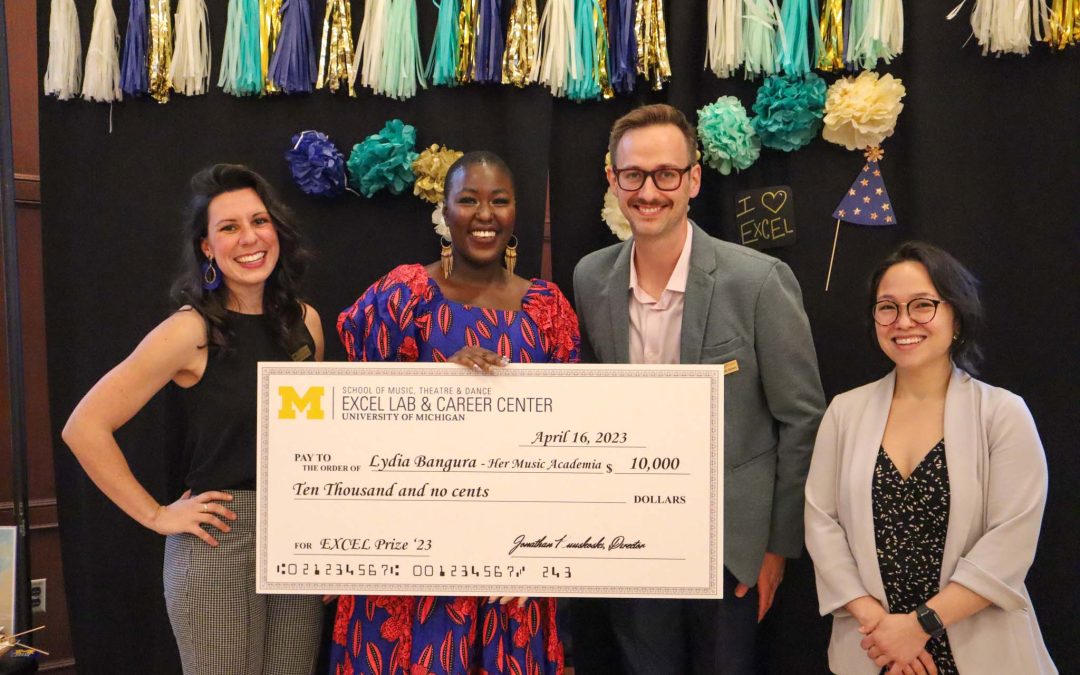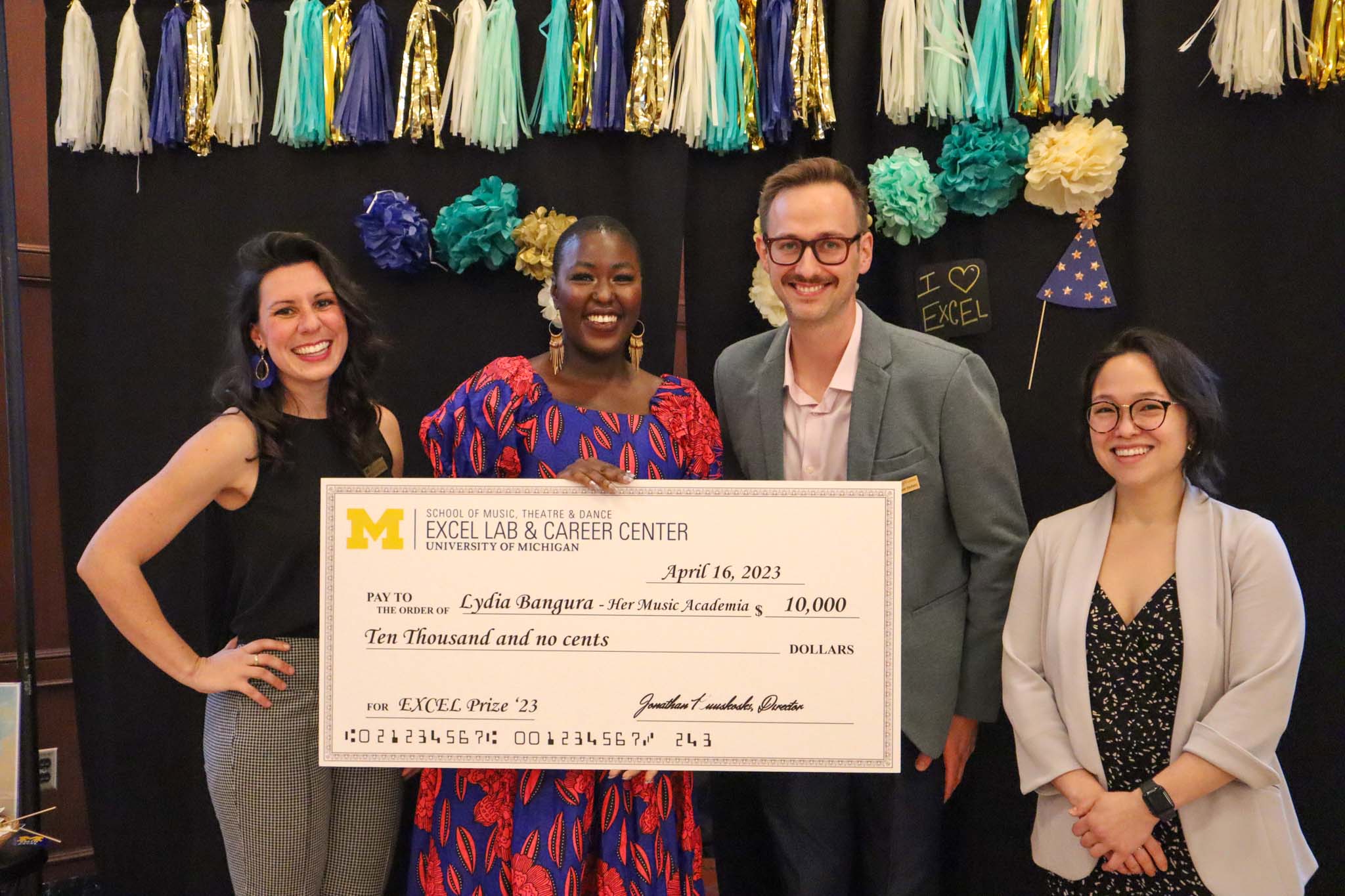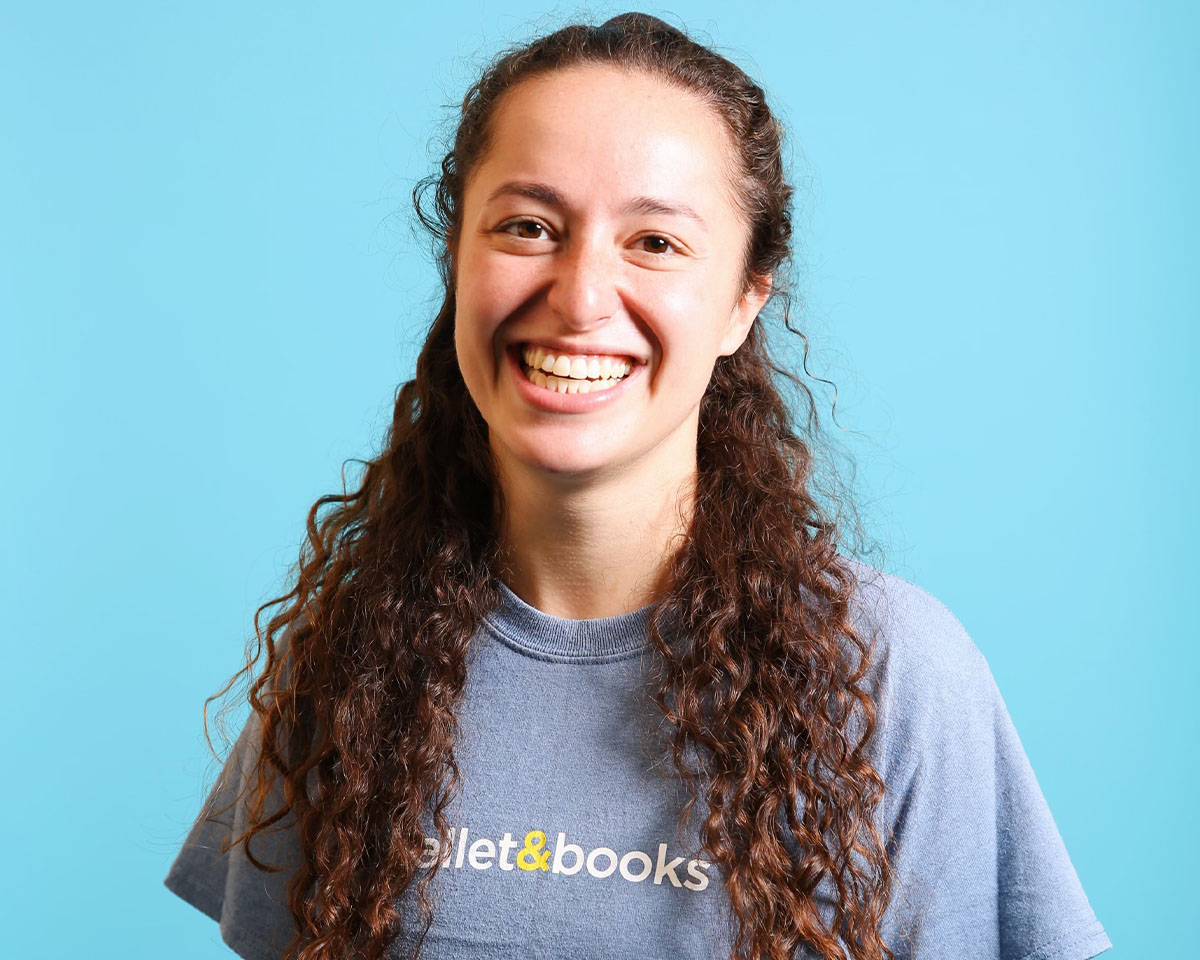Michigan Muse Summer 2023 > Leaders of Tomorrow – EXCEL Lab as a Gateway to Community Impact
Cultivating the Leaders of Tomorrow: The EXCEL Lab as a Gateway to Community Impact
By Claudia Capos
For years, Kisa Uradomo (MM ’21, SM ’23, violin) dreamed of creating a music program to inspire students such as herself, who grew up in relative isolation on the Hawaiian island of Maui. But she was uncertain about how best to launch this ambitious venture.
“I wanted to honor the music educators who had supported me and give back to the Maui community by tackling the issue of accessibility to music education,” said Uradomo, who learned to play the violin from Skype videos and from teachers who flew to Maui from Oahu. “It was difficult to engage with music, so being able to leave the island was formative for my growth,” she added. “Not every family or student has that privilege, so I decided to bring the music to Maui. I want music to be accessible to all who wish to engage with it, whether through learning, performing, or listening.”
With mentoring, support, and $5,000 in funding from SMTD’s EXCEL Lab EXCELerator – an annual incubator for early stage, student-led performing arts ventures – Uradomo turned her entrepreneurial dream into reality by launching Hana Hou Music Program on Maui in August 2022. The two-week summer music program provides free presentations to K-12 schools and local music organizations, as well as public concerts. The phrase hana hou means do it again, repeat, or encore in the Hawaiian language.
“The EXCELerator helped us distill our core values and think about aspects of our organization we hadn’t considered before,” Uradomo said. “Initially, we were very focused on our program’s outreach, but not necessarily on running a sustainable organization. I don’t think we have it all figured out yet, but we feel like we have the tools and resources to help us on our journey.”
Following the successful launch of Hana Hou Music Program last year, Uradomo and her team immediately began preparing for their 2023 season, which ran August 12–26. Students are already showing greater interest in music and learning new instruments, and one school is looking to expand the number of beginning string classes.
“Our program’s vision is to honor the opinions of Hawaii’s residents and teachers in order to create a healthy learning environment,” Uradomo said. She plans to raise additional grant funding, offer the music program semiannually on Maui and extend it to other islands, and build a school where music and the arts can flourish.
Prioritizing Entrepreneurship and Social Impact
Since launching in fall 2015, the Excellence in Entrepreneurship, Career Empowerment & Leadership (EXCEL) Lab has served as SMTD’s home base for performing arts entrepreneurship, leadership, and career services. EXCEL’s mission is to help every SMTD student acquire the resources they need to build a sustainable, fulfilling, and impactful life in the arts. Through its awards program, it has nurtured hundreds of initiatives that prioritize social impact, seeking to partner with local communities to improve arts access, education, or representation.
More than 5,000 students have benefited from EXCEL’s suite of services, including one-on-one coaching, 25 entrepreneurship courses, and a variety of standalone co-curricular events, such as panel discussions, workshops, and immersive excursions to cultural centers. To date, nearly $800,000 of funding has gone to support more than 100 internships, hundreds of projects, and the launch or growth of 42 student ventures, all of which have social impact goals. Funding is provided to 95 percent of the students who apply for it.
“We have found that, across the board, SMTD students are driven by a passion for connecting with communities, and of finding ways to advance their artistry to make the world a better place,” said Jonathan Kuuskoski, assistant professor, chair of the Department of Entrepreneurship & Leadership, and director of the EXCEL Lab. “We help students turn their ideas into action and develop the mindset, skillset, and network to make a successful transition into professional life equipped with the agency to realize that impact, regardless of whether they want to work in an organization or start their own venture.”
One hallmark of EXCEL is its broad programming scope, which spans the entrepreneurial continuum from ideation and early development to seed funding and formal launch. Multiple points of access allow students to procure entrepreneurial assistance whenever and wherever they need it.
“We seek to grow student entrepreneurs within SMTD and help them advance their projects, interests, and experiences while deepening their engagement over time, as well as encouraging students to build upon their own existing networks when considering project partners and teams,” explained Gabrielle Piazza, assistant director. She oversees the EXCELerator and offers guidance on nuts-and-bolts issues, such as business models, organizational structures, and future funding. “One distinctive feature of our work,” Kuuskoski noted, “is the way we are able to blend leadership, management, entrepreneurship, and professional development resources at a personalized level to help students see community engagement and impact as a core part of every artist’s life, regardless of whether they plan to start a venture, secure a job, or develop a project-based career.”
Presenting Marginalized Perspectives in Music
Lydia Bangura learned about the EXCEL Lab several months after starting her doctoral degree in music theory at SMTD last fall. The timing couldn’t have been better.
Two years earlier, she had launched Her Music Academia, a website intended to serve as a public platform for her current research interests, as well as a space for public conversations between musicians. In Her Music Academia podcasts, Bangura places particular emphasis on presenting marginalized perspectives in music and highlighting the voices, research, and music of women of color.
“I knew that coming into the field of music theory as a Black person and a woman, it would be harder to get my scholarly papers published in academic journals,” said Bangura, a soprano who has performed in numerous operatic productions. “I decided to start my own podcast and blog to share the things I was learning in school with an online community and to invite conversation and feedback around these ideas,” she explained. “I wanted to break down the barriers people can encounter in higher education.”

Lydia Bangura. Photo credit: Maiso Photography
Initially, Bangura was a one-person show, handling all the research, hosting, interviewing, writing, and editing of the Her Music Academia podcast and blog by herself. To date, she has produced 40 podcast episodes and amassed more than 8,000 plays across seven podcast streaming platforms. “There is a lot of power in hearing people’s stories about their early musical experiences, and the influences and pathways that led to the work they are doing now,” Bangura said. “This demonstrates there is not just one way to become a musician or to pursue a career in the music field.”
However, this labor of love proved time-consuming for a doctoral student beginning work on her PhD at SMTD. Bangura knew she needed more resources in order to maintain and grow her enterprise. “Friends at Michigan who had gotten EXCEL Lab grants suggested I apply to the program to get funding for equipment and staffing,” she recalled. “I met with Jonathan and Gabrielle in January, and they urged me to apply for the EXCEL Prize.” The EXCEL Prize, with its $10,000 cash award, recognizes excellence in performing arts entrepreneurship, leadership, and social impact. It is awarded annually to a U-M student or student team that has established a standout performing arts venture.
To Bangura’s delight, she was selected as the 2023 EXCEL Prize winner. She will use the prize money to hire a small production staff and to expand the reach and frequency of Her Music Academia podcasts. “This award has implications for my professional career and my personal life,” Bangura said. “I love connecting with music scholars and musicians, because it is valuable for networking and strengthening my own sense of community.”
Reaching Out to Marginalized Communities
Two exciting interdisciplinary student ventures – o-PONG! Productions and Ballet & Books – are different in many respects, yet they share a common mission of engaging youth and adults from marginalized communities in a variety of educational and artistic programs.
o-PONG! Productions, an independent multimedia production company founded by Andrew Otchere (BFA ’23, theatre) and Cortez Hill (BTA ’24, theatre; BBA ’24, Ross), provides a creative launchpad where underserved and misrepresented communities can present their unique stories through the lens of comedy and pride.
The two student entrepreneurs aim to increase accessibility and visibility for marginalized communities by producing high-quality content for film, television, theatre, digital platforms, and live events. Their first collaborative effort was a short film called Branch Out, which Otchere began writing during the COVID-19 pandemic. “Once I finished the script, I was very passionate about bringing it to life,” Otchere said. “That’s when I found Cortez, a brilliant producer and dual-degree student. With the success of that project, we decided to continue creating together – and the rest is history.”
Recently, they partnered with EnspiRED Runway, a U-M student-led arts, fashion, and charity organization on campus, to produce a digital fashion show that highlighted the skills and talents of predominantly Black artists and other creative individuals of color. Hill and Otchere plan to showcase their current projects in New York City during the summer while continuing to network with production companies and artistic collaborators. Their long-term goal is to be a sustainable production company that creates, premieres, and distributes content that represents the communities they serve.
Otchere and Hill say EXCELerator funding and professional mentorship was critical in helping them solidify their business model, network with prominent production companies, and further the development of their current projects. “EXCEL mentors have assisted us in creating a pitch deck for potential investors, outlining the legal and financial structures of our business, and networking at the 2023 Yale Innovation Summit with the support of Midnight Oil Collective [a creator-led arts investment, development, and production group],” Otchere and Hill noted. “This experience has taught us so much about the inner workings of combining our artistic passions with impactful entrepreneurial ventures.”
Partnering with Washtenaw Early Head Start
A happy accident connected two entrepreneurial-minded U-M students, Kara Roseborough (MFA ’24, dance) with Talia Bailes, a medical student. Their unplanned encounter jump-started the launch of a U-M Ballet & Books chapter on campus and laid the groundwork for an arts-focused educational partnership with the Washtenaw Early Head Start program.
“I previously worked for an organization called Books & Breakfast in Evanston, Illinois, and the SMTD Dance Department’s administrative specialist, Katie Gunning, thought I said Ballet & Books,” Roseborough said. “She reached out to Ballet & Books’ founder, Talia Bailes, who just happened to be starting her first year at the University of Michigan as well. The three of us met with Christian Matijas-Mecca, chair of the dance department, last fall, and we agreed to create a U-M Ballet & Books chapter that would be supported by the department,” she continued. “Community engagement has been central to my work as a professional artist, and I’m glad to be working with Talia and the dance department on this new venture.”
Ballet & Books combines dance and dialogic reading to provide literacy support to low-income and minority students in underserved areas. Through the program, art and literature join forces to make a huge difference in the lives of young learners. This fall U-M student mentors will begin working one-on-one with Early Head Start students, ages three to six, in Ypsilanti, Michigan, to provide an engaging educational and artistic program. The Head Start students will come away with valuable skills, a supportive community, and, ideally, a lifelong love of reading.
In an opportunity unique to the U-M chapter, young students in the Ballet & Books program will get the opportunity to participate in the Michigan premiere of The Nutcrack(ish), a show Roseborough choreographed and co-wrote with her father, Tim Rhoze, for Fleetwood-Jourdain Theatre in Evanston in 2018. “I’m excited to bring this ballet to the university as part of my graduate work and to expand U-M’s community engagement mission by combining it with my work with Ballet & Books,” she said. “With the help of an EXCEL Lab Impact Award, this entrepreneurial venture will provide Ballet & Books students and their families with a well-rounded literacy and artistic experience.”
In addition to funding, the EXCEL Lab offered Roseborough and Bailes financial advice, grant-writing assistance, and professional development guidance. “I see this venture as an opportunity for the Department of Dance and SMTD to invest educationally and socially in the surrounding communities in meaningful ways, to value and honor the communities with which we engage, and dismantle barriers or harmful cultural practices frequently upheld by predominantly white institutions,” Roseborough said. “As a Black ballet dancer,” she added, “I would love to see more Black and Brown dancers and scholars coming to SMTD and thriving.”







